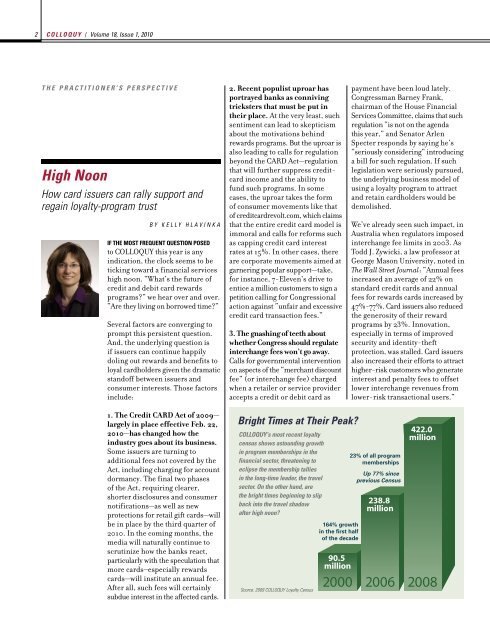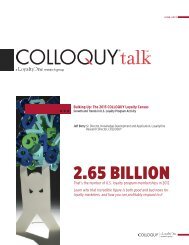Transformers - Colloquy
Transformers - Colloquy
Transformers - Colloquy
You also want an ePaper? Increase the reach of your titles
YUMPU automatically turns print PDFs into web optimized ePapers that Google loves.
2<br />
C O L L O Q U Y / Volume 18, Issue 1, 2010<br />
T H E P R A C T I T I O N E R ’ S P E R S P E C T I V E<br />
High Noon<br />
How card issuers can rally support and<br />
regain loyalty-program trust<br />
B Y K E L L Y H L A V I N K A<br />
IF THE MOST FREQUENT QUESTION POSED<br />
to COLLOQUY this year is any<br />
indication, the clock seems to be<br />
ticking toward a financial services<br />
high noon. “What’s the future of<br />
credit and debit card rewards<br />
programs?” we hear over and over.<br />
“Are they living on borrowed time?”<br />
Several factors are converging to<br />
prompt this persistent question.<br />
And, the underlying question is<br />
if issuers can continue happily<br />
doling out rewards and benefits to<br />
loyal cardholders given the dramatic<br />
stand off between issuers and<br />
consumer interests. Those factors<br />
include:<br />
1. The Credit CARD Act of 2009—<br />
largely in place effective Feb. 22,<br />
2010—has changed how the<br />
industry goes about its business.<br />
Some issuers are turning to<br />
additional fees not covered by the<br />
Act, including charging for account<br />
dormancy. The final two phases<br />
of the Act, requiring clearer,<br />
shorter disclosures and consumer<br />
notifications—as well as new<br />
protections for retail gift cards—will<br />
be in place by the third quarter of<br />
2010. In the coming months, the<br />
media will naturally continue to<br />
scrutinize how the banks react,<br />
particularly with the speculation that<br />
more cards–especially rewards<br />
cards—will institute an annual fee.<br />
After all, such fees will certainly<br />
subdue interest in the affected cards.<br />
2. Recent populist uproar has<br />
portrayed banks as conniving<br />
tricksters that must be put in<br />
their place. At the very least, such<br />
sentiment can lead to skepticism<br />
about the motivations behind<br />
rewards programs. But the uproar is<br />
also leading to calls for regulation<br />
beyond the CARD Act—regulation<br />
that will further suppress creditcard<br />
income and the ability to<br />
fund such programs. In some<br />
cases, the uproar takes the form<br />
of consumer move ments like that<br />
of creditcardrevolt.com, which claims<br />
that the entire credit card model is<br />
immoral and calls for reforms such<br />
as capping credit card interest<br />
rates at 15%. In other cases, there<br />
are corporate move ments aimed at<br />
garnering popular support—take,<br />
for instance, 7-Eleven’s drive to<br />
entice a million customers to sign a<br />
petition calling for Congressional<br />
action against “unfair and excessive<br />
credit card transaction fees.”<br />
3. The gnashing of teeth about<br />
whether Congress should regulate<br />
interchange fees won’t go away.<br />
Calls for governmental intervention<br />
on aspects of the “merchant discount<br />
fee” (or interchange fee) charged<br />
when a retailer or service provider<br />
accepts a credit or debit card as<br />
Bright Times at Their Peak?<br />
COLLOQUY’s most recent loyalty<br />
census shows astounding growth<br />
in program memberships in the<br />
financial sector, threatening to<br />
eclipse the membership tallies<br />
in the long-time leader, the travel<br />
sector. On the other hand, are<br />
the bright times beginning to slip<br />
back into the travel shadow<br />
after high noon?<br />
Source: 2009 COLLOQUY Loyalty Census<br />
164% growth<br />
in the first half<br />
of the decade<br />
90.5<br />
million<br />
2000<br />
payment have been loud lately.<br />
Congressman Barney Frank,<br />
chairman of the House Financial<br />
Services Committee, claims that such<br />
regulation “is not on the agenda<br />
this year,” and Senator Arlen<br />
Specter responds by saying he’s<br />
“seriously considering” introducing<br />
a bill for such regulation. If such<br />
legislation were seriously pursued,<br />
the underlying business model of<br />
using a loyalty program to attract<br />
and retain cardholders would be<br />
demolished.<br />
We’ve already seen such impact, in<br />
Australia when regulators imposed<br />
interchange fee limits in 2003. As<br />
Todd J. Zywicki, a law professor at<br />
George Mason University, noted in<br />
The Wall Street Journal: “Annual fees<br />
increased an average of 22% on<br />
standard credit cards and annual<br />
fees for rewards cards increased by<br />
47%-77%. Card issuers also reduced<br />
the generosity of their reward<br />
programs by 23%. Innovation,<br />
especially in terms of improved<br />
security and identity-theft<br />
protection, was stalled. Card issuers<br />
also increased their efforts to attract<br />
higher-risk customers who generate<br />
interest and penalty fees to offset<br />
lower interchange revenues from<br />
lower-risk transactional users.”<br />
23% of all program<br />
memberships<br />
Up 77% since<br />
previous Census<br />
238.8<br />
million<br />
2006<br />
422.0<br />
million<br />
2008




